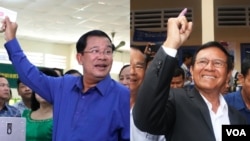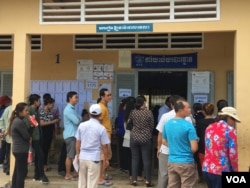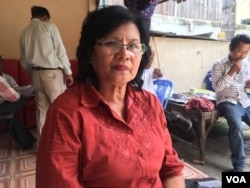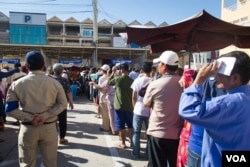The major political parties competing in Cambodia’s local elections on Sunday both claimed victory at the polls despite the officials results announcement being delayed.
The ruling Cambodian People’s Party claimed it had secured more than 1,100 commune seats out of a possible 1,646, while the opposition Cambodia National Rescue Party said it had secured huge gains and a large proportion of the overall vote in an election that was largely free of irregularities.
Unofficial results posted by Fresh News, a pro-government website, suggested the CPP had won 1,163 commune chief seats compared to 482 for the CNRP and one for the Khmer National Unity Party.
If the figures are accurate, it would signify large gains for the opposition, which won just 40 seats in the 2012 commune elections.
The National Election Committee was supposed to start announcing results shortly after polls closed, but by the evening had yet to start posting official results.
The CNRP claimed it had won 46% of the votes and more than 500 communes, including winning more than half of the communes in Phnom Penh.
Kem Sokha, CNRP president, said he hoped the local election results were an indication of support going into the general election scheduled for next year.
“The CNRP was successful and took a big stride in the commune elections,” he said in a statement. “The result will be the foundation that we build on to win in 2018.”
Chan Samnang, a female opposition candidate standing in Russey Keo commune in the capital, said she had won by some 3,400 votes over her CPP rival.
Samnang held the commune from 2007 to 2012 when she lost the seat amid claims of election fraud.
“The current voting system is not 100 percent good, but it is better than last time,” she said.
She claimed that she won this time around because locals recognized the work she had done for them in the past.
Peung Chansreyroth, 34, said she voted for the CNRP because she wanted change.
“I voted for the CNRP because I wanted a fair commune chief,” she said.
Oeun Kimheng, 21, a university student, claimed the previous commune chief was inefficient.
“Services for providing documents were always late,” she said. “Any party is fine with me, but my decision to vote depends on my confidence and belief in a party that is capable of performing its duties.”
The former commune chief, Moul Virak, declined to comment.











